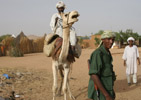
Yesterday, the deputy chairman of Sudan’s electoral commission, Abdullah Ahmed Abdullah announced that Sudan’s general elections (parliamentary and presidential) will be postponed until 2010. Abdullah told AFP, “The electoral process starts this April and will finish in February 2010.”
Sudan last held elections in 1986, when the Umma party’s Sadiq al-Mehdi won; al-Medhi was overthrown by the current President Bashir in 1989 in a bloodless coup.
Officials from both of the major Sudanese political parties welcomed the decision. President Bashir’s National Congress Party, or NCP, expressed confidence that the new schedule allows adequate time for “transparent elections” and international and local monitors. Riek Machar, southern Sudanese vice president and leader of the South’s main political party, the SPLM, also welcomed the decision but hoped that this delay will not affect the referendum in southern Sudan, slated to occur in 2011 in keeping with deadlines set with the Comprehensive Peace Agreement, or CPA.
As mandated by the CPA, the original date for Sudan’s general elections was July 2009. However, as this date loomed closer, it became abundantly clear to Sudanese and international actors that the substantial and necessary preparations could not be completed in time for credible elections to occur throughout the country. Despite the time bought by the delay, a number of key questions and logistical issues must be addressed in the extended run up to the elections. As a recent United States Institute of Peace briefing notes, holding elections in an area of ongoing conflict [Darfur] is possible, but not recommended.”
Sudan’s upcoming elections are not only a crucial benchmark in the currently lagging CPA implementation process; the elections have the potential to be a historical milestone, and they will certainly have significant political consequences, as various political actors jockey to assess the risks and rewards inherent in Sudan’s long-awaited electoral process.

